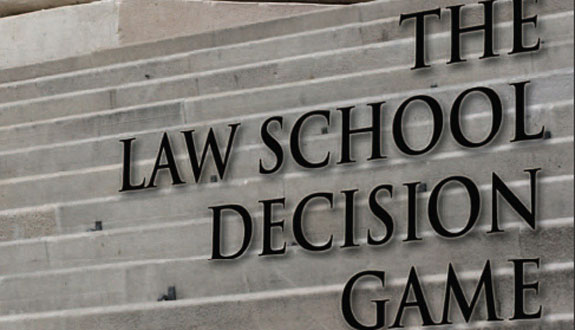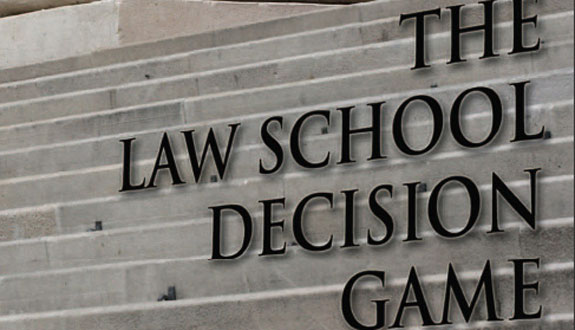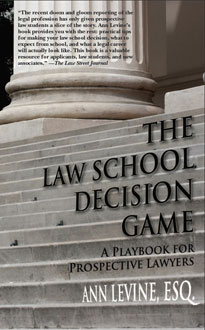Book Review: The Law School Decision Game
- by
- Jan 14, 2012
- Admissions, Odds and Ends
- Reviewed by: Matt Riley


It’s been a long time since we’ve done a book review on Most Strongly Supported. Too long, in fact.
So let’s get back on the wagon with a look at The Law School Decision Game: A Playbook for Prospective Lawyers, written by LawSchoolExpert.com head honcho and Most Strongly Supported pal Ann Levine, Esq. The book is a follow-up to her bestseller, The Law School Admissions Game, which got rave reviews.
The legal world today is treacherous, and Levine doesn’t shy away from being direct about it. In fact, Levine is blunt (and refreshingly so) about most of the information she presents in the book. Due to the inevitable debt and an unstable job market, Levine says as early as the introduction that entering law school is as risky as ever.  And that’s probably why law school applications in the fall of 2011 dropped 12 percent from the previous year. Levine, who surveyed 300 attorneys for the book and quotes them throughout, doesn’t hesitate to give her honest opinion on the future of law schools and the legal industry, saying early in the book: “I believe that current trends are just that — current — and that things will change, although they won’t necessarily go back to the way they used to be. “
And that’s probably why law school applications in the fall of 2011 dropped 12 percent from the previous year. Levine, who surveyed 300 attorneys for the book and quotes them throughout, doesn’t hesitate to give her honest opinion on the future of law schools and the legal industry, saying early in the book: “I believe that current trends are just that — current — and that things will change, although they won’t necessarily go back to the way they used to be. “
What follows is a breezy, fun-to-read cocktail of data, advice and testimonials. (That’s right — a cocktail.) The data was most impressive; it felt like there was an informative graph or chart every five pages. One of the more interesting (and, not coincidentally, simple) charts depicts the median salaries of lawyers whom Levine surveyed. The results: Entry-level attorneys bring home about $52,000 a year compared to general counsels who make roughly $133,000. Of course, all of the data, some of which was collected by Levine and some of which she attributes to other studies, is presented with the intention of making a reader’s law school decision easier.
Levine is quick to point out that no one should pursue a career in law solely for monetary reasons. She argues that such a decision should be weighed on a large number of factors (hence, the purpose of the book). The most important factor, Levine argues, is whether or not you truly want to be a lawyer.
Sure enough, there’s a chart that breaks down why the people whom Levine surveyed went to law school. 73 percent of working lawyers said it was to learn how to think like a lawyer (uh-huh), while 72 of law applicants said it was because enjoy solving problems (ah). Even more telling, 76 percent of those surveyed said they were glad they attended law school.
The second half of the book focuses on legal life in general — understanding why lawyers have to work so hard (32.9% of lawyers surveyed said they work between 51-60 hours a week), the business side of law, the pros and cons of biglaw versus corporate law versus opening your own practice, and what to expect from a career in litigation or deal-making.
The book wraps up with advice regarding law school — everything from choosing where to get a JD to what students can do while in school to ensure they land a job after graduation. Not surprisingly, 59.8 percent of surveyed lawyers said the law school they attended was the most important factor in landing their first gig. Coming in a close second with 44.1 percent of the votes: Getting good grades. (So get good grades at a good school and you’re good. Got it? Good.)
So while the most important message to take away from the The Law School Decision Game (which is available on Amazon and Law School Expert now) is that you must first determine if law school is right for you, Levine does a heck of a job helping you out if that answer is “yes.”
Search the Blog

Free LSAT Practice Account
Sign up for a free Blueprint LSAT account and get access to a free trial of the Self-Paced Course and a free practice LSAT with a detailed score report, mind-blowing analytics, and explanatory videos.
Learn More
Popular Posts
-
logic games Game Over: LSAC Says Farewell to Logic Games
-
General LSAT Advice How to Get a 180 on the LSAT
-
Entertainment Revisiting Elle's LSAT Journey from Legally Blonde








